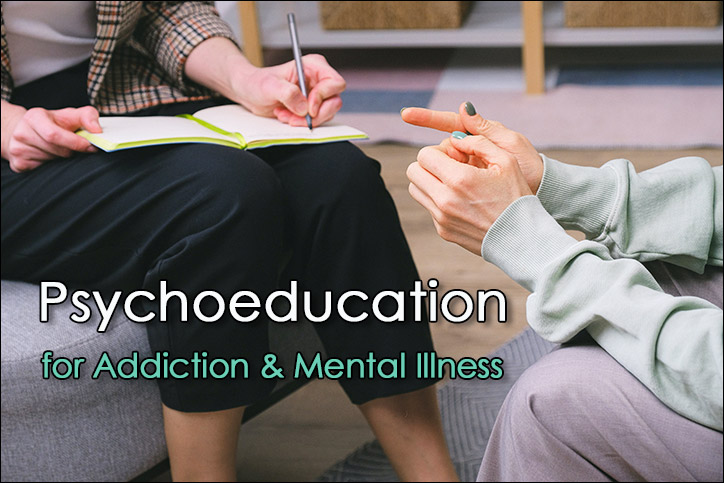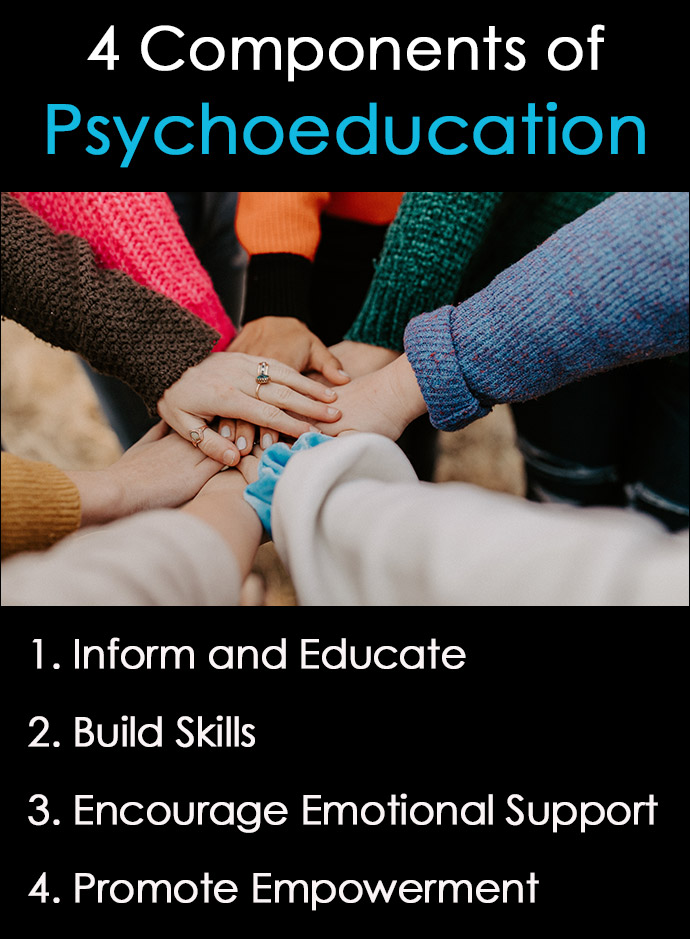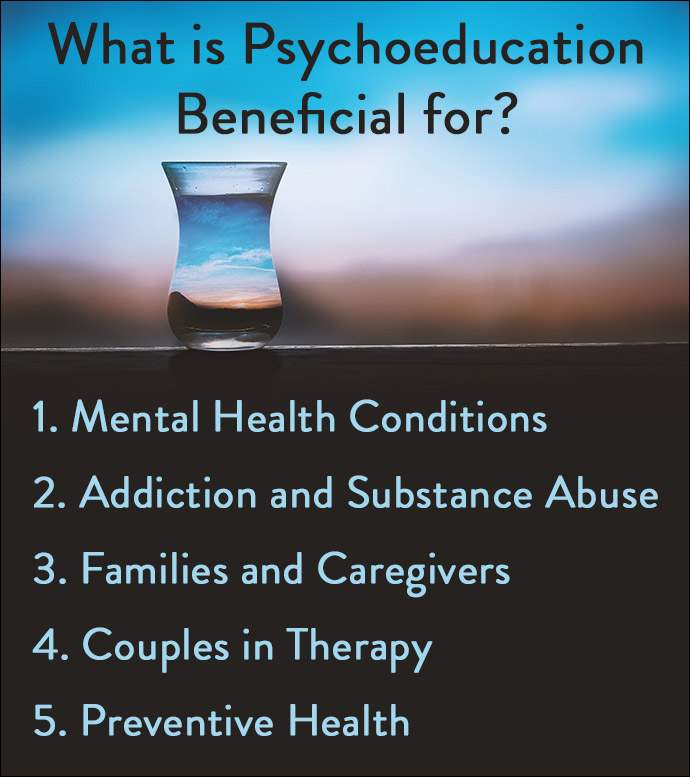Table of Contents
Psychoeducation for addiction and mental illness is a beneficial therapy method for the treatment and recovery of a wide range of mental health conditions.
It is recognized as a valuable resource for educating clients and patients about the causes and treatment for their particular health issues and how therapy can transform recovery.
It’s necessary to understand the significance of the essential components of psychoeducation and explore the benefits and how it can be used with other therapies.
What is Psychoeducation?
Psychoeducation is an evidence based therapy approach that integrates education with psychological principles to increase an individual’s understanding of mental health issues and addictive behaviors.
It differs from some treatment methods by educating patients about their condition or illness, promoting a sense of control, and empowering them with the tools to be successful on their journey to recovery.
Psychoeducation Definition
The Social Work Dictionary by Robert L Barker defines psychoeducation as the process of teaching clients with mental illness and their family members about the nature of the illness, including its etiology, progression, consequences, prognosis, treatment, and alternatives.
Etiology refers to the causes of a condition or disease.
Psychoeducation aims to provide individuals and families with insightful information about mental health and addiction disorders so they can make informed decisions, effectively manage symptoms, and actively participate in the treatment process.
This approach recognizes that informed individuals are better equipped to manage their mental health and addiction issues while developing a holistic and sustainable path to wellness.
4 Components of Psychoeducation
One of the main objectives of psychoeducational therapy is to ensure a client or patient has a thorough understanding of the causes of their condition and the most effective ways of treating it and preventing a relapse.
This is accomplished using four components of psychoeducation that include:
1. Inform and Educate
By providing detailed information and educating an individual about addiction and mental health disorders, it equips them with a proper understanding of the nature, causes, and consequences of their condition.
It also clarifies any misconceptions they might have and reduces the stigma associated with these conditions.
2. Build Skills
Psychoeducation teaches practical coping mechanisms to manage stress, triggers, and cravings, and improves problem-solving and decision-making skills that are essential for maintaining a lasting recovery.
In addition, it develops interpersonal and communication skills that cultivate healthy relationships.
3. Encourage Emotional Support
Psychoeducation encourages the development of emotional intelligence and resilience so that an individual is well prepared for recovery.
It creates a safe space for individuals to express their emotions and experiences while inspiring a sense of belonging that reduces isolation and connects them with others who are facing similar challenges.
4. Promote Empowerment
Promoting empowerment offers a sense of control over one’s life and their recovery journey.
This encourages individuals to set realistic goals and work towards achieving them as well as strengthening self-advocacy and making informed choices regarding appropriate treatment options.
Psychoeducational Groups
Psychoeducational groups are a cornerstone of psychoeducation that provide a structured and supportive environment for individuals to learn, share, and grow with others.
These groups offer a positive environment for participants to learn more about their condition, build skills necessary for recovery, and receive peer support that encourages healing.
Benefits of Psychoeducational Groups
1. Shared Experiences
Shared experiences within a group promotes empathy and creates a supportive community where all participants gain a better understanding of their addiction and mental health challenges. It also reduces the feelings of isolation during recovery.
2. Skills Reinforcement
Group settings provide opportunities to practice and reinforce coping skills learned in individual therapy. Peer feedback and encouragement further improves the learning process during treatment.
3. Normalization
Group members discover that they are not alone in their struggles, which greatly helps to normalize their experiences. A supportive community makes the process of
overcoming the shame and stigma of a condition much more achievable.
4. Peer Support
Peer support is a powerful way for individuals to receive validation and encouragement from others who understand the challenges of addiction and mental health issues. Participating in a group also promotes accountability and motivation that are indispensable for recovery.
5. Diverse Perspectives
Learning about diverse perspectives and coping methods that have been effective for others in the group can be invaluable for discovering successful recovery strategies.
Requirements for Effective Psychoeducational Groups
1. Structured Program
Effective psychoeducational groups should provide a structured program that covers essential topics related to addiction and mental health conditions and all materials should be accessible and and easy to understand for everyone in the group.
2. Trained Therapist
Psychoeducation groups are led by a trained therapist with expertise in the topics being discussed and they strive to create a safe and non-judgmental space for participants to share and learn from each other.
3. Encourage Participation
The therapist leading the group should encourage all members to actively participate in discussions, role-playing exercises, and sharing personal experiences.
4. Appropriate Content
The lead therapist provides appropriate discussion material that fits the unique needs of each group member and adjusts the pace to maximize learning. Group members should explore topics that most closely relate to their personal experiences.
Who Benefits from Psychoeducation?
Psychoeducation is a versatile and inclusive treatment approach that benefits a wide range of individuals, including those dealing with various mental health challenges and addiction issues.
Psychoeducation is beneficial for the following:
1. Individuals with Mental Health Disorders
People diagnosed with depression, anxiety disorders, bipolar disorder, schizophrenia, and other conditions benefit from psychoeducation by better understanding their condition, finding tools to manage symptoms, and developing coping strategies.
2. Individuals with Substance Use Disorders
Psychoeducation is particularly valuable for people struggling with substance abuse and addiction. It provides insights into the causes and symptoms of addiction, how different substances affect mental health, and offers tools for managing triggers and preventing relapse.
3. Families and Caregivers
Psychoeducation extends its benefits to the families and caregivers of individuals dealing with addiction and mental health issues. It helps them better understand the challenges faced by the people they care about and strengthens communication strategies for providing support.
4. Couples in Therapy
Couples with mental health and substance abuse issues benefit from psychoeducation by learning about conflict resolution, improving communication, and understanding each other’s needs.
5. Preventive Health
Psychoeducation plays an important role in preventing addiction and mental health issues before they arise by offering tools and strategies to maintain mental well-being and avoid developing more severe issues.
Types of Psychoeducation
There are a number of types of psychoeducation and each one is tailored to address specific needs and challenges.
Common Types of Psychoeducation Include:
Individual Psychoeducation
Individual Psychoeducation involves one-on-one sessions between a mental health professional and an individual. It is personalized to address the specific concerns, symptoms, and needs of the individual with the focus is on providing information and therapies that are relevant to the person’s recovery.
Psychoeducational Groups
Psychoeducational Groups involve sessions that include a small group of individuals who share similar conditions. It provides a supportive environment where group members learn from each other’s experiences, share insights, and build a sense of belonging.
Family Psychoeducation
Family psychoeducation is designed for family members of an individual struggling with substance use addiction or mental health issues. It helps them understand the condition, learn effective communication strategies and skills to support their loved one’s recovery.
Inpatient and Outpatient Programs
Psychoeducation is integrated into both inpatient and outpatient treatment programs. In inpatient settings, individuals receive intensive education alongside other therapeutic interventions. Outpatient programs may incorporate psychoeducation as part of a comprehensive treatment plan.
Psychoeducation for Specialized Disorders
Some psychoeducation programs are designed for specific conditions or disorders such as anxiety management, depression prevention, or post-traumatic stress disorder (PTSD).
Specialized types of psychoeducation target the specific needs of individuals, families, and communities. Because the formats are very flexible, it allows health professionals to modify the approach to fit the audience and the specific needs and goals of the psychoeducational intervention.
Psychoeducation and Cognitive Behavioral Therapy
Psychoeducation and Cognitive Behavioral Therapy (CBT) are two complementary approaches that can be offered alone or combined to maximize addiction and mental health treatment.
Both treatment modalities share similar principles of collaboration, setting goals, and building practical skills.
Ways Psychoeducation and Cognitive Behavioral Therapy Work Together
Shared Foundation of Understanding
Psychoeducation teaches individuals about their addiction or mental health condition, as well as the causes and symptoms to understand the challenges for recovery.
Cognitive Behavioral Therapy adds to that foundation by teaching individuals about the connection between thoughts, feelings, and behaviors, and explains how and why negative thought patterns impact emotions and actions.
Cognitive Restructuring
Psychoeducation teaches individuals about the impact of thoughts on emotions and behavior. It provides tools to recognize and overcome negative thought patterns.
CBT engages cognitive restructuring through guided discussions and exercises to identify and reframe unhealthy thoughts and focus on more realistic thinking.
Building Coping Skills
Psychoeducation helps individuals build coping strategies such as relaxation techniques and stress management skills.
CBT focuses on building cognitive and behavioral skills to manage negative thoughts and emotions and develop healthier responses to challenging situations.
Goal Setting and Problem-Solving
Psychoeducation and CBT both encourage individuals to set realistic goals and problem-solving strategies for their well-being and recovery.
Experiential Learning
Psychoeducation includes experiential learning through discussions, role-playing, and interactive exercises and CBT complements it by developing coping strategies in real-life situations to reinforce their effectiveness.
Empowerment and Confidence
Both approaches empower individuals with the knowledge and tools to effectively manage their recovery and the positive changes they experience increases the confidence to keep going.
Integration in Group Settings
Psychoeducational groups and CBT group therapy both allow patients to share their experiences with others and gain insight and support from like-minded peers.
Both treatment methods integrate well with each other by educating a person about their addiction or mental health condition and providing the tools to successfully address negative behavioral patterns.
For all of the reasons outlined here, Psychoeducation is considered a valuable resource for healing and treating addiction and mental health conditions.
By educating a person about their addiction or mental health condition and developing effective coping skills, it promotes lasting changes for an individual’s health and recovery.





